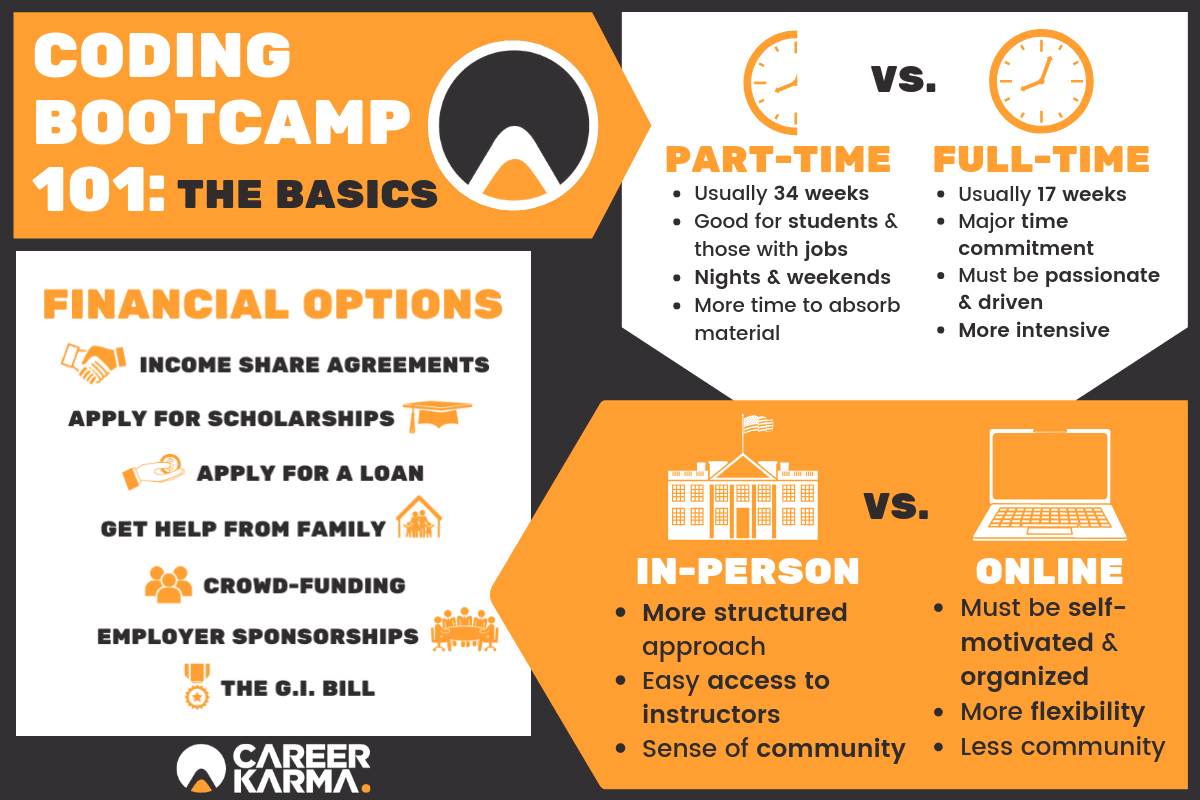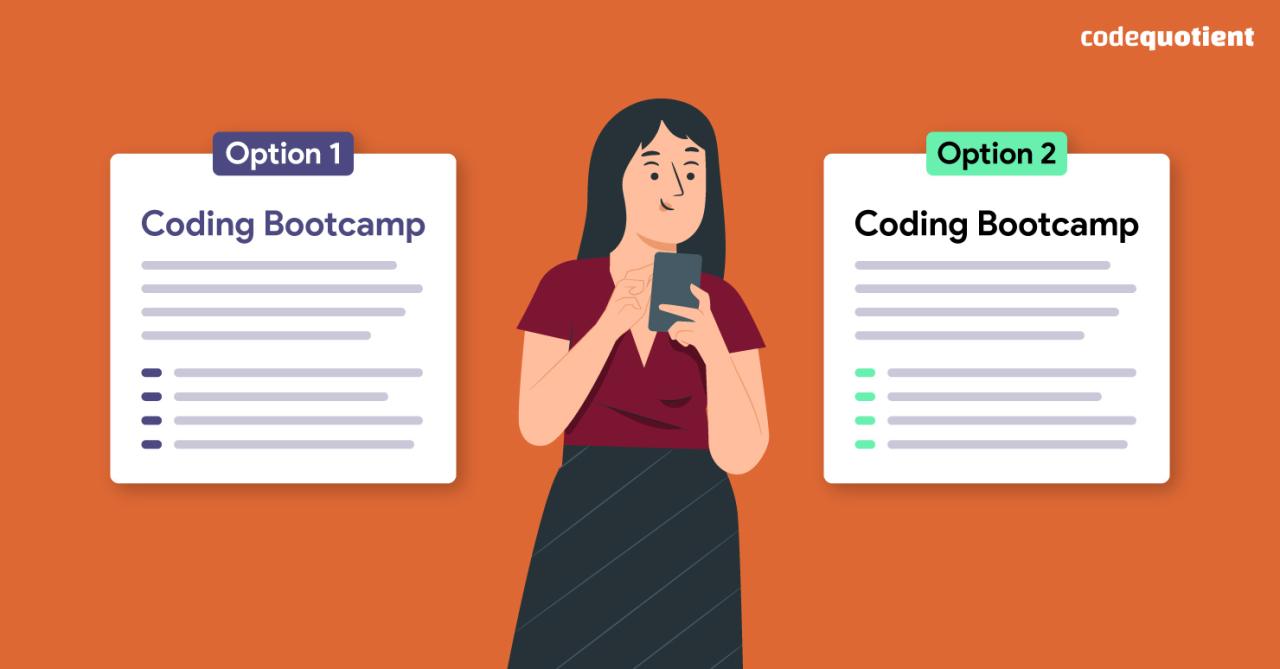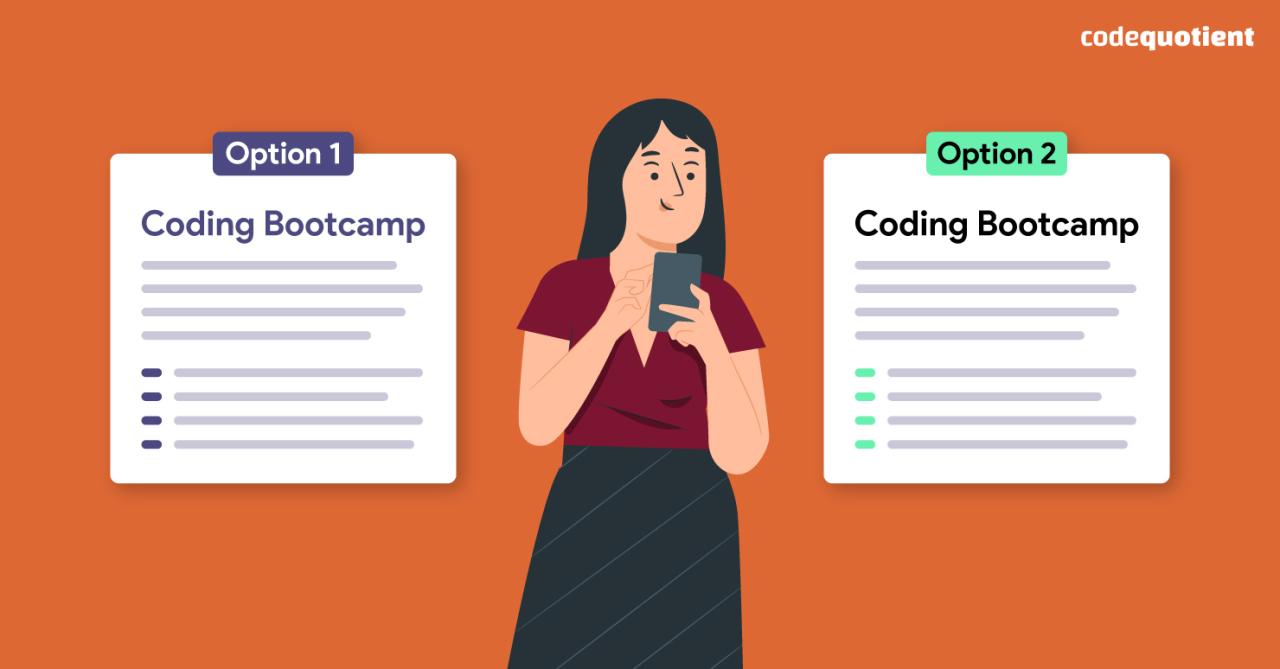Types of Coding Bootcamps: What’s A Coding Bootcamp

Coding bootcamps offer intensive training in various programming disciplines, catering to diverse career goals and learning styles. The choice of bootcamp depends heavily on individual aspirations, learning preferences, and financial considerations. Understanding the different types available is crucial for making an informed decision.
What’s a coding bootcamp – Bootcamps vary significantly in their specializations, teaching methodologies, costs, and durations. This diversity allows prospective students to select a program perfectly aligned with their specific needs and career ambitions.
Coding Bootcamp Specializations
Coding bootcamps offer a range of specializations, each focusing on a particular area of software development or related fields. Popular specializations include web development, data science, cybersecurity, and mobile app development. Web development bootcamps, for instance, often cover front-end technologies like HTML, CSS, and JavaScript, as well as back-end languages such as Python, Node.js, or Ruby on Rails. Data science bootcamps, on the other hand, emphasize statistical analysis, machine learning, and data visualization using tools like Python with libraries such as Pandas and Scikit-learn. Cybersecurity bootcamps provide training in network security, ethical hacking, and penetration testing.
Teaching Methodologies in Coding Bootcamps
Different bootcamps employ varying teaching methodologies to suit diverse learning styles. Project-based learning is a common approach, where students actively build projects throughout the program, reinforcing theoretical knowledge through practical application. This hands-on approach allows for immediate feedback and the development of a robust portfolio. Lecture-based bootcamps, while still incorporating practical exercises, rely more heavily on instructor-led sessions and theoretical explanations. Self-paced bootcamps offer greater flexibility, allowing students to progress at their own speed, but often require more self-discipline and motivation.
Cost and Duration of Coding Bootcamps, What’s a coding bootcamp
The cost and duration of coding bootcamps vary considerably depending on the specialization, location, and intensity of the program. Generally, full-time bootcamps, which typically last 3 to 6 months, are more expensive than part-time programs, which may extend over a year or more. The average cost can range from several thousand to over twenty thousand dollars, with variations influenced by factors such as the reputation of the institution and the level of individual support provided. For example, a highly-regarded bootcamp in a major city offering specialized instruction in a high-demand area like Artificial Intelligence will likely command a higher price than a more generalist program in a smaller city.
Comparison of Bootcamp Types
| Specialization | Duration (Months) | Average Cost (USD) | Teaching Methodology Examples |
|---|---|---|---|
| Web Development | 3-6 | $10,000 – $15,000 | Project-based, Lecture-based, Hybrid |
| Data Science | 4-8 | $12,000 – $20,000 | Project-based, Lecture-based, Self-paced |
| Cybersecurity | 3-6 | $10,000 – $18,000 | Lab-based, Project-based, Lecture-based |
| Mobile App Development | 3-5 | $8,000 – $14,000 | Project-based, Lecture-based |
Choosing the Right Bootcamp

Selecting the right coding bootcamp is a crucial decision that can significantly impact your career trajectory. A well-chosen bootcamp provides the skills, network, and support necessary for a successful transition into the tech industry. Conversely, a poorly chosen bootcamp can lead to wasted time, money, and ultimately, disappointment. Careful consideration of several key factors is essential to ensure a positive and rewarding experience.
Choosing a coding bootcamp involves evaluating various aspects to find the best fit for your individual needs and goals. These factors encompass the bootcamp’s location, reputation within the industry, the comprehensiveness and relevance of its curriculum, and the overall cost of the program. Furthermore, understanding the bootcamp’s support system and career services is equally vital.
Factors to Consider When Selecting a Coding Bootcamp
Location plays a significant role in your bootcamp experience. Consider proximity to potential employers, the cost of living in the area, and the overall learning environment. A bootcamp in a major tech hub might offer more networking opportunities but also comes with higher living expenses. Conversely, a bootcamp in a smaller city may offer a more affordable option, but potentially fewer job prospects directly after graduation.
Reputation is another critical factor. Research the bootcamp’s track record, looking for reviews and testimonials from past students. Check online forums and review sites to gauge the overall student experience and job placement success rates. Look for evidence of strong industry partnerships and a history of graduates successfully securing employment in their chosen fields.
The curriculum should be carefully examined to ensure it aligns with your career goals and the current demands of the tech industry. A comprehensive curriculum will cover a broad range of relevant technologies and programming languages, providing a strong foundation for your future career. Check if the curriculum is regularly updated to reflect the latest industry trends and technologies.
Cost is a significant consideration. Compare the tuition fees of different bootcamps, taking into account any additional expenses such as accommodation, transportation, and learning materials. Look for bootcamps that offer financing options or scholarships, if needed. Consider the return on investment (ROI) – will the increased earning potential after graduation justify the bootcamp’s cost?
Bootcamp Evaluation Checklist
Before enrolling in a coding bootcamp, it’s advisable to create a checklist to ensure you’ve thoroughly investigated all aspects. This checklist should include items such as:
- Location and accessibility
- Reputation and reviews from past students
- Curriculum content and relevance to your career goals
- Tuition fees and financing options
- Career services and job placement support
- Instructor experience and teaching style
- Student support system and community
- Graduation rate and job placement statistics
This checklist will help you systematically evaluate different bootcamps and make an informed decision.
Researching Bootcamp Credibility and Success Rate
Thorough research is vital to ascertain a bootcamp’s credibility and success rate. This involves examining their job placement statistics, independently verifying these statistics, and researching the backgrounds and experiences of their instructors. Look for verifiable data on graduate employment rates, average salaries of graduates, and the types of companies hiring their graduates. Don’t just rely on the bootcamp’s self-reported statistics; seek out independent verification through online reviews, alumni networks, and industry contacts. For example, a bootcamp claiming a 90% job placement rate should be able to provide supporting documentation or links to verifiable sources.
Networking with Bootcamp Alumni
Networking with bootcamp alumni is an invaluable resource. Alumni can provide firsthand insights into the bootcamp experience, the curriculum’s effectiveness, and the job placement support offered. Connect with alumni through the bootcamp’s website, LinkedIn, or other professional networking platforms. Attend bootcamp events or webinars to meet alumni and learn from their experiences. Directly asking alumni about their post-bootcamp career paths and the value they derived from the program provides invaluable perspectives. For instance, reaching out to several alumni on LinkedIn and asking for informational interviews can provide a comprehensive understanding of the bootcamp’s effectiveness.
Financing a Coding Bootcamp

Funding your coding bootcamp education is a significant step, requiring careful consideration of various financial options and their long-term implications. The cost of a bootcamp can vary widely, impacting the choice of financing method and ultimately, your overall financial picture after graduation. Understanding your options and potential return on investment is crucial for making an informed decision.
Several avenues exist to finance your coding bootcamp. Each carries unique advantages and disadvantages, influencing the total cost and repayment terms. Choosing the right option depends on your individual financial situation, risk tolerance, and post-bootcamp employment prospects.
Financing Options for Coding Bootcamps
Bootcamp financing typically involves a combination of personal savings, loans, scholarships, and income share agreements (ISAs). Let’s explore each option in detail.
| Financing Option | Pros | Cons | Long-Term Implications |
|---|---|---|---|
| Personal Savings | No interest, no debt, greater financial control. | May require significant upfront savings, potentially delaying bootcamp enrollment. | Lower overall cost, faster financial recovery post-graduation. |
| Student Loans (Federal or Private) | Can cover a substantial portion of tuition, flexible repayment options. | Accumulates interest, potentially high overall cost depending on interest rates and repayment period. Impacts credit score. | Higher overall cost, potential long-term debt burden, affecting future financial decisions. |
| Scholarships and Grants | Reduces overall cost, no repayment required. | Competitive application process, limited availability. | Lower overall cost, improved financial stability post-graduation. |
| Income Share Agreements (ISAs) | No upfront cost, payments tied to post-graduation income. | Percentage of income paid for a set period, potential for high payments if salary exceeds expectations. May limit career choices. | Cost depends on income level and duration of the agreement. Can be beneficial for those with uncertain income prospects, but carries risk. |
Return on Investment (ROI) of a Coding Bootcamp
The ROI of a coding bootcamp is a crucial factor in evaluating its financial viability. It’s calculated by comparing the total cost of the bootcamp (including financing costs) against the increase in earning potential after graduation. A successful bootcamp graduate often sees a significant salary increase, leading to a positive ROI within a relatively short timeframe. For example, a graduate might invest $15,000 in a bootcamp and then secure a job paying $80,000 annually, significantly exceeding their pre-bootcamp salary. This rapid increase in earning potential can quickly offset the initial investment.
Long-Term Financial Implications of Different Financing Methods
The long-term financial implications vary greatly depending on the chosen financing method. Loans, while offering immediate access to funds, lead to long-term debt and interest payments. ISAs, on the other hand, defer payments but tie them to future income, potentially resulting in higher overall costs if salary expectations are not met. Conversely, financing through personal savings or scholarships avoids debt altogether, leading to faster financial recovery and greater financial freedom after graduation. Careful planning and realistic projections of post-bootcamp earnings are essential to making an informed decision.


Tim Redaksi